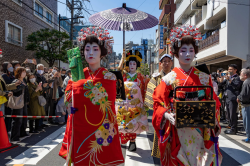
Originally published on metropolis.co.jp on January 2012

From the vault
- A recently discovered New Year’s card written in 1855 by the Tokugawa-Era revolutionary Shoin Yoshida contains the line, “I’ve had my fill of rice-cake soup, and thunder is rumbling in my stomach.”
- The mayor of Osaka vowed to put an end to the “100-year war” between the city and surrounding Osaka Prefecture. His proposed unification plan would “sort out redundant projects and unify broad-based administrative work.”
- The last operating evacuation shelter for victims of the March 11 earthquake and tsunami was shut down in Fukushima Prefecture. In the days following the disaster, the prefecture’s 400-plus shelters housed 73,608 evacuees.
- Meanwhile, the British ambassador to Japan was knighted for his efforts in the aftermath of the quake, in particular for displaying “exceptional qualities of leadership and empathy.” Three Japanese staffers at the embassy were appointed MBEs.
International affairs
- The Tokyo Metropolitan Government announced that it would send 10,000 youngsters overseas over the next eight years in an effort to “rectify their increasingly inward-looking mindsets.”
- The justice ministry says it will begin a point system for foreigners who want to work in Japan. Preferential treatment will be given to candidates with superior “academic career[s], employment history and annual income.”
- The government decided to ease restrictions on arms exports, including weapons systems developed with other countries and domestically produced “defense-related equipment.”
- Sentence of the Week: “An 80-year-old Sapporo man released by North Korea after his arrest last year said he went there with two other Japanese men to obtain counterfeit US currency, according to Hokkaido police.” (via The Daily Yomiuri)
Fish tales
- It was reported that visitors to an aquarium in Gifu are snapping photos of a rare albino catfish and keeping the pics on their keitai as good luck charms.
- The Coast Guard says it is “mystified” as to how a small fishing boat that was swept away by the March 11 tsunami from a port in Iwate wound up on the opposite side of Honshu, in Hyogo, where it was discovered on New Year’s Eve.
- Tokyo-based publisher Kin-No-Hoshi has come out with a book called Farewell from the Heart: The Compassionate Mortician of the Great East Japan Earthquake.
- It was reported that Makoto Hirata, the Aum Shinrikyo cult member who surrendered to police last month after 16 years on the run, originally tried to turn himself in at MPD headquarters in Tokyo, but was turned away by an officer who thought he was pulling a prank.
Dead Men Walking
- Last year marked the first time since 1992 that no death row inmates were executed in Japan.
- At the same time, the number of prisoners on death row has swelled to 129—the highest figure since 1949.
- The situation led the father of a murdered woman whose killer is awaiting execution to declare, “Justice ministers are shirking their lawful responsibility.”
- On a related note, officials say that although nearly half of all death row inmates require medication for “mental stress,” none of the criminals can be labeled “insane.”
And the survey says…
- Ninety-two percent of respondents to a recent newspaper poll said they “do not think natural disasters can be conquered.” We’re just wondering what the f@*# the other 8 percent are smoking.
- The government conducted a survey asking people what they “have become more conscious about” since the March 11 disaster. The top four answers were “saving electricity,” “preparing for future disasters,” “placing more importance on ties with family members and relatives,” and “we should not be affected by rumors.”
- A local meteorological observatory in Kagoshima reported that Mt. Sakurajima erupted a record 996 times in 2011.
- The health ministry says the number of deaths in Japan last year outweighed the number of births by 204,000, marking the largest population decline since recordkeeping began in 1947.
Official statements
- The commanding general of the Ground Self-Defense Force admitted that he thought Japan “was done for” in the early days of the crisis at the Fukushima Daiichi nuclear plant.
- The Supreme Public Prosecutors Office has requested that officials in Tokyo, Osaka, Nagoya and Yokohama allow social welfare experts to sit in on police interrogations of “possibly mentally disabled suspects.”
- Among the themes addressed by the Emperor in his traditional year-end waka poems were his wife’s 77th birthday and the evacuees of the March 11 disaster.
- During a visit to India, Prime Minister Yoshihiko Noda said Japan would contribute ¥4.5 billion toward a large-scale development called the Delhi-Mumbai Industrial Corridor.
This just in…
- The operator of a bicycle sharing company in Omotesando said it chose “a fashionable model of bike in keeping with the fashionable area.”
- Scientists at the University of Tokyo believe that a species of bird called the streaked shearwater “observes some kind of curfew” because it always returns to its nest at the same time of day.
- Police in Kanagawa decided to bring charges against a motorcyclist over an accident in April in which an improperly secured briefcase flew off his bike and caused the death of another biker.
- Bottom Story of the Week: “Sloth Found Dead in Pool at Oita Aquarium” (via The Mainichi Daily News)
Compiled from reports by AP, Japan Today, The Japan Times, The International Herald Tribune, The Asahi Shimbun, Tokyo Reporter, The Mainichi Daily News, Daily Yomiuri, AFP, Reuters and Kyodo







